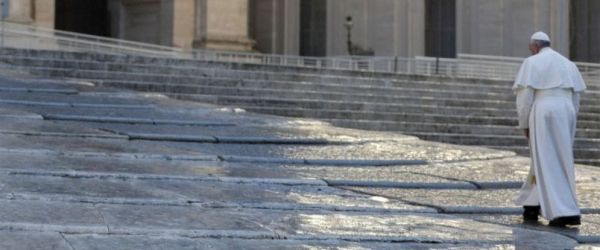Jesus knows well that Peter and the others still have a long way to go to become his Apostles!
At that point, the Teacher turns to all those who were following Him, clearly presenting them the path to follow: “If any man would come after me, let him deny himself and take up his cross and follow me” (v. 24). Always, today too, the temptation is that of wanting to follow a Christ without the cross, on the contrary, of teaching God which is the right path; like Peter: “No, no Lord! This shall never happen”. But Jesus reminds us that his way is the way of love, and that there is no true love without self sacrifice. We are called to not let ourselves be absorbed by the vision of this world, but to be ever more aware of the need and of the effort for we Christians to walk against the current and uphill.
Jesus completes his proposal with words that express a great and ever valid wisdom, because they challenge the egocentric mentality and behaviour. He exhorts: “whoever would save his life will lose it, and whoever loses his life for my sake will find it (v. 25). This paradox contains the golden rule that God inscribed in the human nature created in Christ: the rule that only love gives meaning and happiness to life. To spend one’s own talents, one’s energy and one’s time only to save, protect and fulfil oneself, in reality leads to losing oneself, i.e. to a sad and barren existence. Instead let us live for the Lord and base our life on love, as Jesus did: we will be able to savour authentic joy, and our life will not be barren; it will be fruitful.
In the Eucharistic celebration we relive the mystery of the Cross; we not only remember, but we commemorate the redeeming Sacrifice in which the Son of God completely loses Himself so as to be received anew by the Father and thus find us again, we who were lost, together with all creatures. Each time we take part in the Holy Mass, the love of the crucified and Risen Christ is conveyed to us as food and drink, so that we may follow Him on the daily path, in concrete service to our brothers and sisters.
May Mary Most Holy, who followed Jesus up to Calvary, accompany us too and help us not to be afraid of the cross, but with Jesus nailed [to it], not a cross without Jesus, the Cross with Jesus, which is the cross of suffering for love of God and of our brothers and sisters, because this suffering, by the grace of Christ, bears the fruit of resurrection.
[Pope Francis, Angelus, 3 September 2017]












